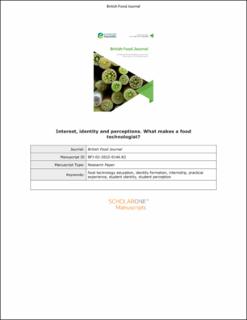Interest, identity and perceptions. What makes a food technologist?
Peer reviewed, Journal article
Accepted version

Åpne
Permanent lenke
https://hdl.handle.net/11250/3015455Utgivelsesdato
2022Metadata
Vis full innførselSamlinger
- Institutt for bioteknologi og matvitenskap [1574]
- Institutt for fysikk [2695]
- Institutt for lærerutdanning [3692]
- Publikasjoner fra CRIStin - NTNU [38127]
Originalversjon
https://doi.org/10.1108/BFJ-02-2022-0146Sammendrag
Purpose
Previous research shows that identity formation is a crucial bridge between higher education and future employment. The objective of this study was to improve our understanding and knowledge of food technology students' prior interests, their perceived identity formation, perceptions of food technology and the profession of food technologist.
Design/methodology/approach
A qualitative study was conducted and the data consisted of audio recordings of 10 semi structured group interviews of first-, second- and third-year students, as well as alumni, at work. The interviews were transcribed and analysed by conventional content analysis, here following an inductive approach.
Findings
Most students had previous general culinary interest, an interest in the science behind or an interest in contemporary food-related issues. Regardless of the year group and prior interest, most felt that graduation was the stage at which they could identify themselves as food technologists. They evolved from having a rather diffuse understanding of food technology and what is a food technologist before they started to have an increased awareness in their second and third years.
Originality/value
The research findings inform higher education food technology programmes aiming to promote the development of food technology students' professional identity. The study suggests that a holistic approach to teaching, as well as context-based and professional activities at an early stage might help students in their identity formation.